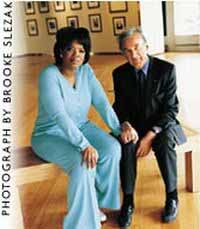|
|
Now that I've discovered what a fallible man
the Nobel Peace Prize winner is, instead of the to-be-revered, kind, caring
and sensitive man I always perceived Elie Wiesel as... (ever since I was
crushed to see how blindly and how irresponsibly he has been willing to throw his lot in with the
Armenians ... that is, without bothering to do his homework, and probably
strictly being motivated by embracing what he thinks are his fellow genocide
sufferers — meanwhile, committing Rufmord against the Turks)... now, suddenly, his flaws
have become all the clearer!
|
|
|
| A
Movie About Hitler |
In the April 12-18, 2003 issue of TV Guide
magazine, America's major publication for television listings, there was an article for a
then-upcoming TV mini-series HITLER: THE RISE OF EVIL (covering the early part of the
Fuehrer's rise to power). This article, entitled "The Controversy Over CBS'
HITLER" mentioned how Jewish groups were concerned about the possibility of
glamorizing the Nazi leader.
The executive producer, Ed Gernon, was trying to take any
of the heat off by emphasizing the film's real message, that Hitler's "grab for power
in Germany in the 1930s is a cautionary tale for contemporary America." Gernon was
quoted as saying: "It basically boils down to an entire nation gripped by fear, who
ultimately chose to give up their civil rights and plunged the whole world into war."
Well, I was very impressed reading that passage. I'm very
concerned my country is going overboard with certain measures (at the time of this
writing, in 2003), and with dogmatic extremists like Attorney General John Ashcroft at the
helm... and with too many Americans beginning to feel all too comfortable with the notion
of the government running their lives, thanks to a cockeyed sense of
"patriotism." Too many of my fellow Americans are obviously unaware of what one
of our country's greatest founding fathers had said: "They that can give up
essential liberty to obtain a little temporary safety deserve neither liberty nor
safety."
(That would be Benjamin Franklin.)
And wouldn't you know it. TIME Magazine reported a few
weeks later that as a result of that very interview, Ed Gernon got FIRED!
(Inadvertently proving his point, TIME added.)

The ones who fired him, incidentally, were Alliance
Atlantis... the production company behind the financing of ARARAT. (I guess they were in a foul mood, still trying to get over
what a disaster Atom Egoyan's film proved to be for them.)
|
Enter... the Hollow-caust Man
|
Elie Wiesel decided to make a few waves of his
own, saying he was uneasy about HITLER: THE RISE OF EVIL since the previous year,
when he wrote to CBS (the television network) president, "expressing his
concern."
"You can be against the
war," Wiesel was quoted as saying, "But to compare America to Germany
under Hitler — no, really, it's almost unworthy of anger, because it's beyond the
pale."
It looks like Elie Wiesel isn't, once
again, paying attention. Just like when he completely overlooked the entire other
side of the Armenian "Genocide" story.
The idea isn't to compare America to
Germany under Hitler; the whole point is to compare America to Germany just BEFORE
Hitler. The underlying message is that a great and civilized nation such as Germany
allowed a villainous slimeball to take the helm because the German people lost
control of their emotions, allowing for their nationalistic pride to take
precedence, which made it much easier for them to give up their freedoms.
Kind of like what happened in this other parallel, which Elie Wiesel
ought to have allowed himself to ponder over.
You know, it's one thing for Elie
Wiesel to disagree (even though he didn't really understand what he was disagreeing
with)... but look at the way he chooses to air his disagreement. It's like he's
looking down his nose at a view that doesn't conform with his superior own, in a
pretty haughty manner. (He's saying the opposing view is just too stupid to take
seriously. Of course, he would have a point if the comparison was between America
and Germany under Hitler, as he misunderstood. But does he still have to be so
uppity about it?)
|
| How Dare They! |
However, what really bothered me was Wiesel's reaction to
not getting a reply from the CBS president, when he wrote to him in 2002, airing his
grievances about a project he didn't know that much about. Here is what he said:
"For the first time in my life, I wrote a letter and I
didn't get an answer." (For the FIRST time in his life? Wow. What about the many
years after he thankfully escaped with his life from the unimaginable horrors, when he was
an ordinary human, before he "became" Elie Wiesel?)
Here's the kicker:
Wiesel found the lack of communication...
"Significant and, of course, offensive."
OFFENSIVE!
The man he wrote to was the extremely busy president of a
major television network... does Wiesel think people should forget about whatever they're
doing and cater to his whims at the moment he snaps his fingers? Especially when he makes
a pest of himself, griping about issues that aren't all that clear yet? (Did Elie Wiesel
believe a major mainstream media outlet like CBS-TV would actually make a hero out of
Hitler..?)
Sadly, for those of us who firmly believe that the Holocaust took place, some
scholars of the Genocide of the Jews have attacked any reconsideration of
Armenian-Turkish relations out of a fear that this will somehow give comfort to
those who, against all evidence, disavow the Holocaust. It must also be admitted
that we academics have been unwilling to undertake studies of Armenian-Turkish
relations, because of problems with career advancement and even physical dangers.
Prof. Justin McCarthy, 1996 Congressional testimony
|
The CBS president tried to save face by explaining he
didn't have anything to say to Mr. Wiesel at the time (of course; that's his prerogative.
Nothing "offensive" about that), quickly making sure to add the
"appropriate people" would be contacting Wiesel (what? No personal reply?), and
that Wiesel is "a man I respect greatly."

Funny. I used to feel the same way.
|
An Exchange with Oprah Winfrey
|
 |
|
Oprah and Elie |
O: On your first night in the (concentration)
camp, you saw babies being thrown into the flames. Can you ever forgive those who
killed the children?
EW: Who am I to forgive? Only the children themselves could forgive. If I forgive, I
should do it in their name. Otherwise, it is arrogant.
Ahh. That's more like it. This
is the wise and wonderful Elie Wiesel I like, and used to respect. (But, you know...
even if he is irresponsibly committing "Rufmord" against the Turkish people, with so-called facts
he doesn't bother to fully investigate... I still like Elie Wiesel. How could you
not like Elie Wiesel?)
|
| ADDENDUM
(4-06) |
Here is genocide-sensitive Elie Wiesel squarely in
the corner of the Armenians and their greatest passion, and how do some (admittedly
somewhat more intense) Armenians think
about him?
Ann Frankenstein - August 24, 2005 07:14 PM (GMT)
"There was only one Holocaust" - Elie Wiesel
Administrator - August 24, 2005 07:32 PM (GMT)
QUOTE (Ann Frankenstein @ Aug 24 2005, 03:14 PM)
"There was only one Holocaust" - Elie Wiesel
That's right. And it didn't happen to jews.
vanetsi - August 25, 2005 03:09 AM (GMT)
Elie Wiesel is an excellent representation of dirty politics combined with a weak will.
How could someone supposedly suffer the brutalities he had to witness and undergo and then
not wish to right all the wrongs caused by similar events? He has been placed in a
position of high recognotion and publicity, where he owes the world to recognize genocide
and use his power to get attention on these happenings in order to start a process to
rectify them. Instead, he succumbs to the pressure of not only America and Israel, but his
own GREED and denounces the urgency of any present genocide and the importance of past
genocides. His Holocaust was the only holocaust--- this statement is the embodiment of the
selfishness that Elie Wiesel posesses. Someone in his position owes it to the world of the
present and the future to act in pure selflesses. If anyone had to live through he
conditions he supposedly did, he must be able to understand the evil of all genocide, not
just his, and stop it.
Doesn't it simply blow your mind? Because Elie
Wiesel didn't go far enough for their tastes, they're all over him like cockroaches on
spilled breadcrumbs. I tell you, there is simply no pleasing some of these
genocide-obsessed Armenians..!
"The pride of race brings about many singularities and prompts
the Armenians to prey on missionaries, Jesuits, consuls and European traveler with
rapacity and ingratitude. The poor Armenians will demand assistance in a loud tone,
yet will seldom give thanks for a donation."— Sir Mark Sykes
|
|